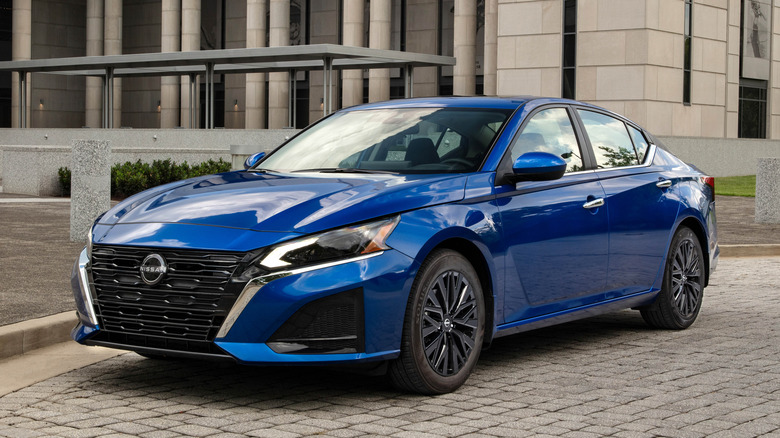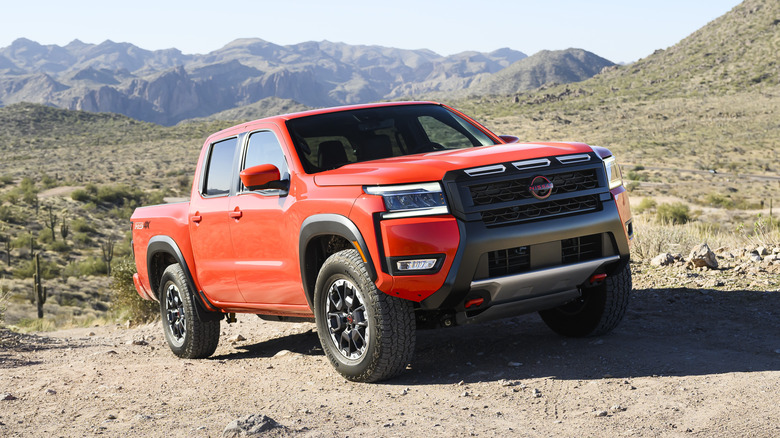Every New Nissan With A CVT Transmission

Nissan has a pretty full lineup of vehicles, including sporty coupes, pickup trucks, and a sedan or SUV in just about every size or configuration you can imagine. And many of those vehicles use CVTs (continuously variable transmissions) to put power down. Unfortunately, CVTs often get a bad rap for their low levels of engagement. They can increase fuel economy compared to standard automatics, which is one of the top reasons automakers use them, but some buyers dislike them and may want to avoid CVTs entirely. So let’s comb through Nissan’s lineup to see which vehicles do (and don’t) have CVTs. A quick note: you may see the name Xtronic on Nissan vehicles, but don’t get tripped up — that’s just the name the company uses for its CVT.
In most trims, the sub-compact Nissan Versa pairs a CVT with a 1.6-liter four-cylinder engine, while its bigger brother, the Sentra, uses a CVT in combination with a 2.0-liter four-cylinder engine. The Kicks, a small SUV from Nissan, also uses a CVT with that same 2.0-liter engine, which proved to be relatively uninspiring when we tested it earlier this year. The Kicks Play is the previous-generation Kicks re-branded and sold under a new name as its entry-level SUV, and it also uses a CVT. Nissan’s compact SUV, the Rogue, pairs an Xtronic CVT with a turbocharged 1.5-liter three-cylinder engine. The Altima sedan also uses an Xtronic CVT. To recap, here are the 2025 Nissan vehicles that use CVTs: Kicks Play, Kicks, Rogue, Versa, Sentra, and Altima.
Nissans that still use automatics or manuals

Nissan has quite a few CVT models, but the automaker hasn’t gone all-in on the technology just yet. Plenty of its vehicles, especially ones aimed at enthusiasts or intended as workhorses, use traditional automatic or manual transmissions. So, just to balance things out, let’s talk about the non-CVT vehicles you can get with a Nissan badge. The newest Nissan Z, for example, lets you pick between a six-speed manual or a nine-speed automatic transmission. While most trims of the Versa come with a CVT, the base S trim comes with a five-speed manual transmission. In that configuration, the Versa becomes one of the least expensive new vehicles you can buy in 2025.
The 2025 Pathfinder is powered by Nissan’s 3.5-liter VQ V6 engine, which is paired with a nine-speed automatic transmission. The large Nissan Armada SUV uses a twin-turbocharged 3.5-liter V6 paired with a nine-speed automatic transmission. The Murano SUV also uses a nine-speed automatic transmission, but it’s paired with a turbocharged 2.0-liter four-cylinder engine. Nissan’s Frontier pickup opts for a 3.8-liter V6, also mated to a nine-speed automatic. It’s also worth noting that EVs don’t use CVTs. So, the Nissan Ariya uses a single-speed transmission (also known as direct drive) to go with its electric motor, while the Leaf uses a single-speed gear reducer.
Which Nissan Models Do Not Have CVT?

Nissan has long been a popular choice for drivers looking for reliable, stylish, and affordable vehicles. One of the hot topics among Nissan enthusiasts and potential buyers is the type of transmission a vehicle has—particularly, whether it features a Continuously Variable Transmission (CVT) or a traditional automatic transmission. While CVTs are known for offering smoother acceleration and better fuel economy, some drivers prefer the feel and driving experience of a conventional automatic gearbox. If you’re curious about which Nissan models do not have CVT, you’re in the right place. We’ll explore everything from Nissan’s use of CVT technology, which models stick with traditional transmissions, and what factors come into play when choosing a vehicle without CVT technology.
Overview of CVT Technology in Nissan Vehicles
CVT, or Continuously Variable Transmission, is a type of automatic transmission that doesn’t rely on traditional gears but instead uses a belt and pulley system to offer an infinite range of gear ratios. For Nissan, CVTs became a staple in many models for their efficiency and smooth driving experience, especially in their smaller cars and crossovers. The idea is simple: instead of shifting gears, the CVT adjusts seamlessly to keep the engine in its most efficient power band, which can help improve fuel economy. Drivers often report that CVTs make city driving feel effortless, and they’re generally quieter than traditional automatics. However, some people find CVTs less engaging because they lack the traditional gear shifts that give a sense of connection to the car. Nissan has embraced CVT technology across many of their models, but not every vehicle line-up has fully transitioned to it, leaving some options that still run on traditional transmissions.
Nissan Models Historically Equipped with CVT Transmissions
Over the years, Nissan has widely adopted CVT technology in their small cars, hybrids, and even some crossovers. Popular models like the Nissan Sentra, Altima, and Murano are well-known for their CVT options. The Nissan Rogue, one of their bestselling SUVs, has also been equipped with a CVT for most of its recent generations, emphasizing fuel efficiency and a smooth ride. Nissan’s focus on CVT in many mainstream models has greatly impacted their lineup, making CVT transmissions almost synonymous with their brand in recent years. These models appeal mainly to drivers looking for frugality and comfort, especially in urban environments where stop-and-go traffic is common. Nonetheless, Nissan also offers traditional automatic options in several of these vehicles, especially in higher trims or specific model years, for those who prefer a more traditional driving experience.
Nissan Models Offered with Traditional Automatic Transmissions
While CVT has become the default in many Nissan models, there are still options to choose from that feature traditional automatic transmissions. Notably, some earlier versions of Nissan’s larger vehicles or special trims may come with 6-speed or even 7-speed automatic gearboxes. For instance, certain Nissan Titan trucks and some older Nissan Pathfinder models were equipped with conventional automatic transmissions. These traditional automatics are often praised for their predictable shifting, tactile feel, and in some cases, better towing capacity, making them attractive for drivers who prioritize a more familiar driving experience. Nissan also offers many of their sportier models with traditional automatic transmissions, particularly in markets outside North America or in performance-oriented trims, providing a broader range of options for customers seeking those features.
Nissan Trucks and SUVs Without CVT Options
If you’re into Nissan trucks and SUVs, there’s good news: several models are still available with conventional transmissions. The Nissan Titan pickup trucks, especially the older models, generally come with traditional automatic options, making them ideal for towing and heavy-duty work. The Nissan Armada full-size SUV also offers traditional automatic transmissions across many trims, which appeals to families and those needing more power and towing capacity. While newer SUVs like the Nissan Frontier truck and some trims of the Nissan Pathfinder are shifting toward CVTs for better fuel efficiency, you can still find versions and trims on these vehicles that retain reliable traditional automatic gearboxes. This combination of utility and familiarity makes these models stand out for buyers who dislike CVTs or prefer the feel of conventional automatics.
Nissan Sports Cars and Sedans with Conventional Transmissions
For enthusiasts craving a classic driving experience, Nissan’s sporty sedans often come with traditional automatic transmissions or even manual options. The Nissan 370Z, for instance, is available with a 6-speed manual transmission, offering an engaging, driver-focused ride. Many high-performance trims of the Nissan Maxima and older models of the Sentra also feature traditional automatics, emphasizing quick shifts and driving feel. These manual and conventional automatic options appeal to purists who enjoy a more tactile connection to their car, as opposed to the smoother but less visceral experience of a CVT. If control and performance are paramount, these Nissan models without CVT might be exactly what you’re after.
Key Differences Between CVT and Non-CVT Nissan Models
Understanding the core differences between CVT and non-CVT models helps clarify why a driver might choose one over the other. CVTs excel in delivering superior fuel economy and a smooth, almost seamless acceleration, making them ideal for city commutes and daily driving. In contrast, traditional automatics provide a more predictable shifting pattern, often with faster throttle response and a more engaging driving feel. They typically feel more assertive during acceleration and may have a more durable lifespan under heavy towing or rugged use. Price-wise, CVT-equipped vehicles can sometimes be a tad more affordable initially, but some drivers prefer the mechanical simplicity and reliability of traditional automatics, especially for heavy-duty or performance-oriented applications. Depending on your driving style and priorities, these differences can significantly influence your choice of Nissan model.
Benefits and Drawbacks of CVT vs. Conventional Transmissions in Nissan Vehicles
Choosing between a CVT and a traditional automatic boils down to trade-offs. CVTs shine in providing smooth acceleration and impressive fuel efficiency, which makes them a hit among urban commuters and eco-conscious buyers. They tend to feel effortless, especially during stop-and-go traffic, and newer CVT designs have improved in terms of durability and driving feel. However, some drivers report a less satisfying driving experience, and CVTs can be costly to repair if they fail, given their complex design. On the flip side, traditional automatics often deliver more confident acceleration and a more familiar driving feel, especially in high-torque applications like trucks or sport sedans. They’re generally easier and cheaper to repair when problems arise, providing peace of mind for some drivers. Overall, understanding these pros and cons helps you make an informed decision based on your lifestyle, driving preferences, and budget.
Factors to Consider When Choosing a Nissan Model Without CVT
Your decision to go for a Nissan with a traditional automatic or manual transmission should account for your driving habits, performance needs, and future maintenance considerations. If you prioritize fuel economy and smooth driving, a CVT-equipped Nissan might be the way to go. Conversely, if you often tow, drive in tough terrain, or simply enjoy an engaging driving experience, look for models with traditional automatics or manuals. It’s also essential to weigh your budget, as repairs on CVTs can sometimes be more expensive or less predictable. Additionally, consider the model’s reliability record and your long-term ownership plans. Visiting dealerships, test-driving different models, and doing a bit of homework on the specific transmission options for each trim can save you from future headaches and ensure you pick a Nissan that perfectly matches your driving style.
Future Trends: Will Nissan Continue to Offer Non-CVT Options?
As technology evolves rapidly, automakers, including Nissan, are leaning more and more toward CVT and other advanced transmission systems like dual-clutch automatics and torque converters to meet fuel efficiency standards and emissions targets. That said, Nissan still recognizes the needs of drivers who prefer traditional automatics and manuals in certain models, especially in trucks, performance cars, and specialized trims. The future might see a gradual decline in non-CVT options, but Nissan will likely continue offering select vehicles with traditional gearboxes for enthusiasts, commercial applications, and those who value durability and driver control. Ultimately, if you’re a fan of non-CVT Nissan models, keep an eye on their lineup for the models and trims that retain conventional transmissions, as Nissan balances innovation with tradition to cater to diverse driving preferences.
FAQ
Q: Which Nissan models do not come with CVT?
A: Nissan trucks like the Titan (older models), some trims of the Pathfinder, Armada, and certain sportier or performance-oriented models like the Nissan 370Z are available with traditional automatic or manual transmissions, avoiding CVT technology.
Q: Are non-CVT Nissan models less reliable?
A: Not necessarily. Traditional automatics have a long history of reliability, especially if maintained properly. CVTs, while efficient, can sometimes be more prone to repair issues, but modern designs are improving in durability.
Q: Why would someone choose a Nissan without CVT?
A: Many drivers prefer the driving feel, predictable shifting, and towing capacity of traditional automatic or manual transmissions, especially for trucks, performance cars, or heavy-duty usage.
Related posts:
- Nissan Qashqai 2010 SUV, Crossover 117 Hp Features And Specs
- Nissan Juke 2014 SUV, Crossover 115 Hp Features And Specs
- How Do I Know If I Have Nissan Roadside Assistance
- What Type Of Oil Does A Nissan Use?
- Who Owns St Charles Nissan?
- Does 2014 Nissan Sentra Need Synthetic Oil?
- How To Change Cabin Air Filter In 2012 Nissan Altima
- How To Change Nissan Rogue Brake Light
- How Does The Nissan Leaf Handle In The Snow
- What Engine Is In The Nissan Rogue
- How To Check Transmission Fluid 2008 Nissan Altima
- How To Use Nissan Key Fob Effectively
https://www.slashgear.com/1869105/nissan-cars-cvt-transmission/https://anusedcar.com/nissan/which-nissan-models-do-not-have-cvt/



